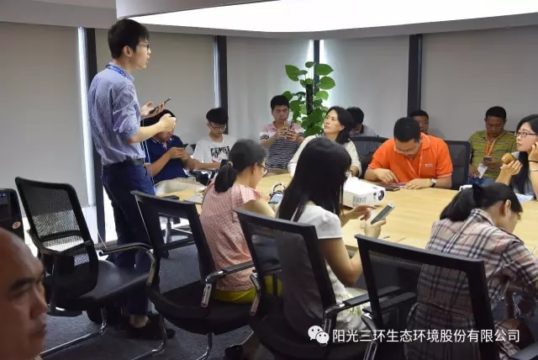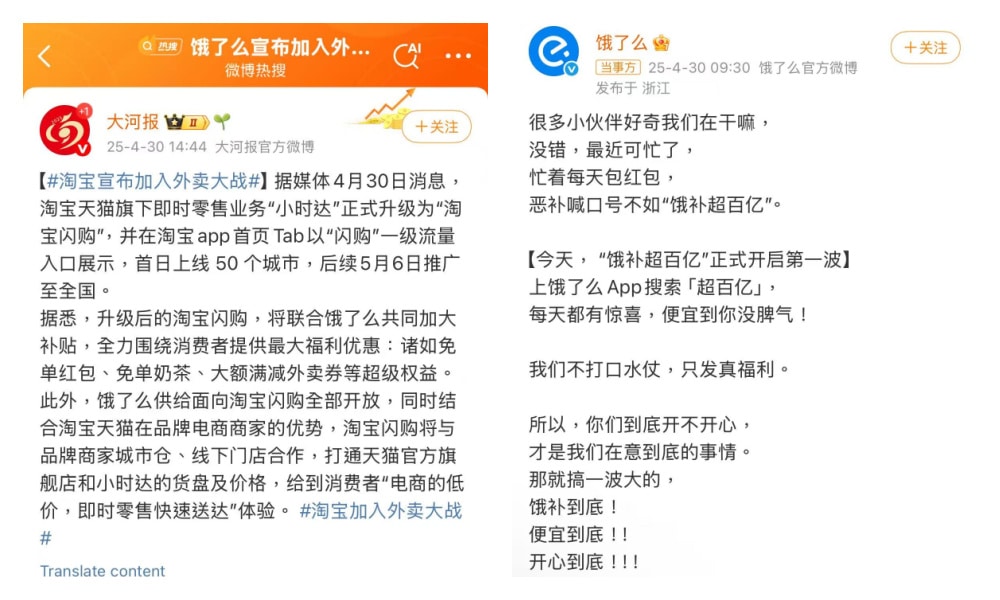China Digital
WeChat for the Workplace: The Rising Popularity of Enterprise App Ding Ding
A nightmare or handy work tool? Alibaba’s Ding Ding is gaining popularity across China.
Published
8 years agoon

While some call it a wonder tool, others say it’s a nightmare for employees. Ding Ding, Alibaba’s mobile and desktop app for companies, is gaining popularity across China. With its GPS-based features and other nifty functions, companies can now monitor the whereabouts of their employees.
It has been over 2,5 years since Alibaba launched its ‘enterprise app’ Ding Ding (钉钉). In February of 2015, websites such as TechCrunch and TechinAsia described the app as a new mobile and desktop program for businesses that aimed to compete with Tencent’s WeChat – China’s top messaging app.
At the time, Ding Ding (also known as DingTalk) was only available in Chinese. But the app, now updated to the 3.5.3 version, has become readily available in English on Chinese app stores, Google Play, and Apple stores.

Its use by companies across China is picking up. The app has now been downloaded 50.5 million times on the Huawei store, 27 million times on the Tencent app store, 20+ million times on the Oppo app store, 12 million times on the Baidu app store, and 8.5 million times on the 360 Mobile Assistant app store.
Smart mobile office
More companies across China are now using the app as a ‘smart mobile office’: it functions as a messaging app among colleagues, a tool for making conference calls, but more importantly, as a program that makes it easy for employees to clock in and out of work and for employers to check their whereabouts.
“Our company just started implementing it. Nobody gave us any warning,” an employee named Bryan Lee (alias) of a middle-sized Beijing educational company told What’s on Weibo this week: “I’ve spoken to many people of other companies here who also started to use it recently.”

Ding Ding has many functions, and in some ways is meant to replace WeChat as a work tool. The app allows users to create team groups, and also functions as an address book that shows the organizational structure of the company. Users can directly contact the HR group or other colleagues through Ding Ding.
According to Alibaba, ‘DingTalk’ is a “multi-sided platform” that “empowers small and medium-sized business to communicate effectively.” The app’s functions include, amongst others, the following features:
– Ding Ding is a global address book that allows users to view the organization’s structure in a glance and contact everyone, but also shows contacts outside of the company (suppliers, business partners, etc.) and functions as a customer information management system.
– The program is also a calendar for creating tasks and meetings.
– Ding Ding is an instant messaging app designed for office use, supporting both private and group chats and supporting file transfers. To improve communication efficiency, all types of messaging display read/unread statuses.
– The app’s ‘Ding It’ function makes sure recipients never miss a message by alerting them through phone, SMS, or in-app notification. Companies can also send out a voice message or hold a conference call to make sure their message is heard.
– The Secret Chat function works like SnapChat, making messages traceless and self-deleting for ultimate privacy and protection.
– Through its Smart Attendance System companies can keep track of employee’s attendance and overtime records; employees can clock-in and out of work in an instant. The software also automatically generates attendance reports.
– Ding Ding can process approvals by electronically dealing with request for leaves, business trips or reimbursements. Approvals for business trips and leave are automatically linked with attendance records.
– DingTalk is also a high-definition video conferencing system and allows users to also start free individual calls.
– Ding Ding has its own business cloud (or “Ding drive”) feature, making file saving and sharing a quick and easy task, also between PC and mobile.
– DingTalk’s email inbox also makes it possible to receive email notifications in chats.
Despite the myriad of functions, or actually because of them, some employees call the app a ‘catastrophe’ for office staff.
Big boss is watching you
“Since Ding Ding is GPS-activated, I will be signed in when I get to work. And when I leave work, it will clock me out,” Lee says.
The app’s clocking system is one of its most used functions and allows companies to track whether their employees arrive late at work or whether they are working overtime.

“Clock out successful. Got off work 18:04.”
There is a positive side to it for employees since there is much less paperwork to fill out when, for example, asking compensation for overtime work. Lee notes that people can also electronically apply for a leave of absence through Ding Ding.
But the downside is that there is no room for white lies anymore. Because of the app’s geotagging function, the employer can actually check if you really are seeing the doctor (as you said you were going to).
“Through Ding Ding you can report where you are for your company. If you requested a leave of absence to go to the hospital, for example, you can bookmark the location so that your company knows you really are at the location where you are supposed to be. Same goes for business-related appointments – if your company requires it, you tag the location so they can see that you are where you said you were going, so they won’t deduct your salary for that.”

“People have a lot of different views on it,” Lee says: “I am always at work when I need to be and I never cheat the system. So I think it is very convenient that I no longer need to take my phone and scan a QR code every day to log in to work, which used to be mafan [trouble] – this is much easier. But a lot of people think it is somewhat Orwellian. They do not monitor your everyday moves but if you actually go drinking with your friends instead of going to a doctor as you told your boss, then that might get you in trouble.”
Apart from the location-tagging function, which may or may not be required/activated by the company, there are also other functions that many people do not like. Ding Ding, unlike WeChat, automatically shows that your message has been delivered and read. It also allows a company to send out a ‘Ding alert’ (which notifies recipients through phone call/SMS/In-App alerts) to make sure everybody gets the message.
On Q&A platform Zhihu.com, user ‘Aurora’, who works at a HR company, tells how this has made life more troublesome for office staff:
“The rapid growth of Ding Ding lies in the fact that it meets the requirements of its user – the boss. Just imagine: you’re in the midst of finishing a proposal when the boss sends you a message saying you need to come over to bring them a certain file.
-
Before using Ding Ding:
1. You see the message. You finish the last part of your proposal before bringing over the file to your boss a bit later.
2. You don’t see the message. You finish your task and take a break. You then see the message and take care of it.
3. No matter if you see did or did not see the message, the boss notices you did not respond and gives you a call.
-
Since using Ding Ding:
1. You see the message. Your boss gets a ‘message read’ (已读) confirmation and you have no other option than to break off your work and immediately take care of it.
2. You haven’t seen it. So your boss sends you a ‘ding alert’ and you have no other option but to read it, break off your work, and immediately take care of it.”
Aurora also writes that Ding Ding is completely made to comply with the demands of the company’s managers rather than their staff. For office staff, it is not convenient to have to respond to the boss’s wishes immediately – it can disturb their everyday tasks and adds stress to their job. For the manager, on the other hand, it has become very easy to reach the staff: they do not even need to pick up the phone anymore, and can reach whoever they want right away.
Unhappy Dingers
On Weibo, many people share Aurora’s views and are not too happy with Ding Ding. “I’ve had enough with this app! It reminds me every single morning to clock in to work!”

“You have to be at work in 12 minutes, don’t forget to clock in!”
Others also complain that the app only adds to the time they spend looking at their phone: “If it’s not my QQ group, then it’s my WeChat group or my Ding Ding group – it seems I am looking at my phone screen all day,” one Weibo user says.
There are also people who note that they are hardly ever really free from work anymore. As one Xiamen worker writes: “I had the morning off. But I had hundreds of WeChat messages, dozens of Ding Ding messages, and three missed phone calls. This is ruining me.”
“With this Ding Ding app it seems like no matter what time it is or where you are, you’re just always at work,” another complaint said.
“It looks like they are going to implement Ding Ding at my office. I just want to punch the person who invented this app.”
But despite all the backlash and complaints, Ding Ding’s popularity as an office solution for immediate workplace communication and registering employee’s working hours is on the rise.
On the app’s review page on the Huawei store, some call it “the best office application.” Others also note that the app is not just convenient, but also free: “It is very practical, and it has saved me the costs for other office management software.”
Other reviewers also seem much more enthusiastic than the complaining netizens on Weibo: “In our office, it’s become an essential tool – and its functions just keep getting better and better.”
By Manya Koetse
Follow @whatsonweibo
Spotted a mistake or want to add something? Please let us know in comments below or email us.
©2017 Whatsonweibo. All rights reserved. Do not reproduce our content without permission – you can contact us at info@whatsonweibo.com.
Manya is the founder and editor-in-chief of What's on Weibo, offering independent analysis of social trends, online media, and digital culture in China for over a decade. Subscribe to gain access to content, including the Weibo Watch newsletter, which provides deeper insights into the China trends that matter. More about Manya at manyakoetse.com or follow on X.

You may like
China Digital
China’s Major Food Delivery Showdown: What to Know about the JD.com vs. Meituan Clash
Consumers are profiting from the full-blown delivery war between JD.com and Meituan—but is it just the same game with a different name?
Published
1 month agoon
April 30, 2025By
Ruixin Zhang
In April 2025, China’s food delivery sector witnessed a somewhat dramatic development, which attracted major attention online, when Chinese e-commerce giant JD.com publicly challenged food delivery leader Meituan.
On April 21, JD.com posted a noteworthy open letter titled “To All Fellow Food Delivery Rider Brothers” (各位外卖骑手兄弟们) on Weibo. In this letter, they accused Meituan (though not explicitly naming them) of monopolistic practices, after the company allegedly forced their delivery staff to stop accepting JD’s delivery orders. If riders chose to deliver for both companies anyway, they’d risk being blacklisted.
JD therefore accused Meituan of unethical behavior, neglecting their workers’ welfare, and pressuring part-time couriers to choose between platforms.
In their letter, JD vowed to support the freedom of Chinese delivery riders to accept orders from various platforms, and pledged to support those who were being blacklisted by offering them sufficient order volumes and full-time positions with benefits, including employment opportunities for their partners.
The bold move, dubbed the “421 Food Delivery Incident” by netizens, ignited widespread online debate.
“Underdog” JD vs. Meituan: The Start of a New Delivery War
JD.com is a household name in China’s e-commerce industry, best known for its electronics retail business. In recent years, it has expanded into fresh groceries, online supermarkets, and instant delivery services. Meanwhile, China’s food delivery market has long been dominated by Meituan (美团) and Ele.me (饿了么), the latter owned by Alibaba. Before a recent online controversy brought attention to it, many people weren’t even aware that JD had entered the food delivery space.
JD’s entry into China’s thriving food delivery market hasn’t been too long ago—the company officially only announced its JD Waimai (京东外卖) food delivery service back in February this year.
Before JD, other major tech companies like Tencent, Baidu, and ByteDance had all tried (and failed) to challenge the dominance of Meituan and Ele.me. But JD has a strong advantage: a massive logistics system with over 300,000 (!) delivery staff. Its Dada (达达) on-demand delivery and local logistics platform also has nearly 1.3 million active couriers, making JD a serious new competitor in China’s food delivery market. Not surprisingly, JD has already started hiring away talent from Meituan.
Amid JD’s growing presence, a post surfaced in April, reportedly from Meituan executive Wang Puzhong (王莆中), mocking JD’s food delivery ambitions as laughable. He used harsh language, calling JD a “cornered dog” making a desperate move (狗急跳墙). Then, on April 15, Meituan’s Flash Delivery service (美团闪送) released a video teasing JD’s supposedly slow delivery speeds (#美团闪购疑似嘲讽京东#). The video showed a dog with the caption: “Your Dongdong is still on the way” — a direct jab at JD, whose mascot is a dog and whose founder, Richard Liu (Liu Qiangdong), is nicknamed “Dongdong.”

JD swiftly hit back. On April 16, a video from an internal JD meeting was leaked, widely seen as a deliberate PR move. In the video, JD founder Richard Liu criticized the food delivery industry, claiming platforms were making excessive profits while restaurants struggled to survive. “Running a restaurant is already hard, yet platforms—just middlemen—are making a fortune,” he said. Liu added that JD would cap its profit margin at 5% and offer full social insurance to its full-time couriers—setting the tone for the official statement that followed.
Then came JD’s April 21 post, which launched a series of serious accusations against Meituan. JD claimed that Meituan had long restricted part-time couriers from working with other platforms and had failed to provide any social insurance to its full-time riders for over ten years. It also criticized Meituan’s working conditions, accusing the company of exploiting riders through algorithm-driven pressure while ignoring their safety. Additionally, JD accused Meituan of squeezing restaurants for profit, turning a blind eye to unhygienic “ghost kitchens,” and neglecting basic food safety standards. The tone of the post was sharply critical.
The attack prompted Meituan to respond publicly. That same evening, it issued a statement on its official WeChat account, denying that it had ever restricted riders from working with other platforms. Meituan also pushed back by accusing JD of mistreating its own couriers, pointing to heavy fines and unfair internal policies as the real issue.
However, Meituan’s response did little to improve its public image. On Weibo and short-video platforms, public sentiment largely turned against Meituan. That night, a netizen posted that JD CEO Richard Liu himself had delivered their JD order. Stories of Liu chatting with riders and restaurant owners quickly went viral, reinforcing his image as a down-to-earth, working-class hero—and earning JD another wave of goodwill.

At the moment, JD enjoys strong public support—not necessarily because it’s doing everything perfectly, but because it has timed its entry well, casting itself as the underdog taking on Meituan, the widely criticized corporate giant.
The Meituan Backlash
There’s no doubt that Meituan is a true giant. In 2024, the company generated a staggering RMB 300 billion (about $41 billion) in revenue. But this delivery empire has long faced ethical criticism—and JD’s recent accusations on Weibo highlight issues that many in the industry have raised before.
Meituan’s commission rates for restaurants are notoriously high, typically ranging from 15% to 25%. According to reports, around 60% of restaurants on the platform operate at a loss—even as Meituan continues to post multi-billion-yuan profits year after year. Many restaurant owners have voiced their frustration online, saying Meituan initially attracted them with generous onboarding incentives, only to gradually increase commissions, service fees, and so-called “tech support charges.” In the end, even strong sales often fail to translate into real profit. Yet with fierce competition and Meituan’s dominance in the food delivery market, many restaurants feel they have no choice but to stay.
For workers, complaints from Meituan couriers are nothing new. The faster they deliver, the more the algorithm shortens their future delivery windows, while slower deliveries result in fewer order assignments. This creates a vicious cycle, pressuring riders to break traffic rules just to meet deadlines. Unsurprisingly, their accident rate is reported to be three times higher than that of express couriers. To make matters worse, Meituan has historically provided no social insurance—neither for full-time nor part-time riders—leaving them on their own when accidents happen. As some couriers bitterly joke, “We’re not people—we’re just human batteries.”
For consumers, the concerns are just as serious. As I noted in an earlier article, Meituan’s platform increasingly hosts “ghost kitchens”—delivery-only outlets that often operate in unsanitary conditions, producing low-cost, low-quality meals to support Meituan’s Pinhaofan service and fuel ongoing price wars. It’s hard to believe Meituan isn’t aware of these practices; it simply appears to look the other way.
These examples are just the tip of the iceberg when it comes to Meituan’s ethical challenges. But for many users, they’re reason enough to delete the app—especially now that JD has positioned itself as a credible alternative.
Of course, few believe Richard Liu is driven purely by social responsibility—he’s long been skilled at presenting himself as a “man of the people.” In JD’s early days, he famously delivered electronics himself in a three-wheeler. Still, as many netizens have put it: “Judge by actions, not intentions” (君子论迹不论心). Whatever JD’s true motives, its current words and actions seem to align with the interests of ordinary consumers and workers. But the question remains: is that enough?
Different name, same game?
For many consumers, the showdown between JD and Meituan has been surprisingly entertaining, and even financially rewarding. The more intense the rivalry, the bigger the discounts. Netizens have been sharing screenshots of good deals they’ve scored from both platforms in recent days. Some media outlets have even declared, “Richard Liu is saving food delivery and changing the industry for good!”
Meanwhile, Taobao and Ele.me have also announced that they’ll be joining the big JD–Meituan showdown by making themselves more competitive. “Taobao Flash Delivery” (淘宝闪购) will now be prominently featured on the main Taobao app, and Taobao and Ele.me will be more closely integrated under Alibaba to offer customers faster delivery times and the best prices. That means more offers—and good news for consumers.

Taobao and Ele.me also join the big battle
But offline, couriers are responding more cautiously. Rider welfare has quickly become a key issue in this corporate battle—and may even become a way for platforms to stand out in a crowded market. But big promises aren’t enough. Only real, visible improvements will earn riders’ trust.
Courier A Ping (阿平) has long been sharing food delivery vlogs online. He used to work for both Meituan and Ele.me. Since April 16, he’s started posting about JD’s delivery platform, and has raised many concerns: part-time riders apparently find it hard to get orders, the system is difficult to navigate, the dispatch logic is flawed, and the navigation is poor.
In the comments section, other couriers are joining the discussion, with many agreeing that JD’s current system only works for full-time employees. “If full-timers get the full benefits, insurance and everything, then it;s probably not that easy to become one,” one wrote. “JD looks promising now, with high pay and benefits, but give it time—it’ll end up the same as the others.”
Another rider, Yu (小于) isn’t too excited about the JD-Meituan feud either. “JD’s fine system is super strict,” he said. “At the end of the day, all these platforms are the same.” Whether JD is just using this moment for PR or genuinely stepping up to take on more social responsibility—only time will tell.
By Ruixin Zhang
Independently covering digital China for over a decade. Like what we do? Support us and get the story behind the hashtag by subscribing:
edited for clarity by Manya Koetse
Spotted a mistake or want to add something? Please let us know in comments below or email us. First-time commenters, please be patient – we will have to manually approve your comment before it appears.
©2024 Whatsonweibo. All rights reserved. Do not reproduce our content without permission – you can contact us at info@whatsonweibo.com.
China Arts & Entertainment
How K-pop Fans and the 13-Year-Old Daughter of Baidu VP Sparked a Debate on Online Privacy
What began as K-pop fan outrage targeting a snarky commenter quickly escalated into a Baidu-linked scandal and a broader conversation about data privacy on Chinese social media.
Published
2 months agoon
March 26, 2025By
Ruixin Zhang
For an ordinary person with just a few followers, a Weibo account can sometimes be like a refuge from real life—almost like a private space on a public platform—where, along with millions of others, they can express dissatisfaction about daily annoyances or vent frustration about personal life situations.
But over recent years, even the most ordinary social media users could become victims of “opening the box” (开盒 kāihé)—the Chinese internet term for doxxing, meaning the deliberate leaking of personal information to expose or harass someone online.
A K-pop Fan-Led Online Witch Hunt
On March 12, a Chinese social media account focusing on K-pop content, Yuanqi Taopu Xuanshou (@元气桃浦选手), posted about Jang Wonyoung, a popular member of the Korean girl group IVE. As the South Korean singer and model attended Paris Fashion Week and then flew back the same day, the account suggested she was on a “crazy schedule.”
In the comment section, one female Weibo user nicknamed “Charihe” replied:
💬 “It’s a 12-hour flight and it’s not like she’s flying the plane herself. Isn’t sleeping in business class considered resting? Who says she can’t rest? What are you actually talking about by calling this a ‘crazy schedule’..”

Although the comment may have come across as a bit snarky, it was generally lighthearted and harmless. Yet unexpectedly, it brought disaster upon her.
That very evening, the woman nicknamed Charihe was bombarded with direct messages filled with insults from fans of Jang Wonyoung and IVE.
Ironically, Charihe’s profile showed she was anything but a hater of the pop star—her Weibo page included multiple posts praising Wonyoung’s beauty and charm. But that context was ignored by overzealous fans, who combed through her social media accounts looking for other posts to criticize, framing her as a terrible person.
After discovering through Charihe’s account that she was pregnant, Jang Wonyoung’s fans escalated their attacks by targeting her unborn child with insults.
The harassment did not stop there. Around midnight, fans doxxed Charihe, exposing her personal information, workplace, and the contact details of her family and friends. Her friends were flooded with messages, and some were even targeted at their workplaces.
Then, they tracked down Charihe’s husband’s WeChat account, sent him screenshots of her posts, and encouraged him to “physically punish” her.
The extremity of the online harassment finally drew backlash from netizens, who expressed concern for this ordinary pregnant woman’s situation:
💬 “Her entire life was exposed to people she never wanted to know about.”
💬 “Suffering this kind of attack during pregnancy is truly an undeserved disaster.”
Despite condemnation of the hate, some extreme self-proclaimed “fans” remained relentless in the online witch hunt against Charihe.
Baidu Takes a Hit After VP’s 13-Year-Old Daughter Is Exposed
One female fan, nicknamed “YourEyes” (@你的眼眸是世界上最小的湖泊), soon started doxxing commenters who had defended her. The speed and efficiency of these attacks left many stunned at just how easy it apparently is to trace social media users and doxx them.
Digging into old Weibo posts from the “YourEyes” account, people found she had repeatedly doxxed people on social media since last year, using various alt accounts.
She had previously also shared information claiming to study in Canada and boasted about her father’s monthly salary of 220,000 RMB (approx. $30.3K), along with a photo of a confirmation document.
Piecing together the clues, online sleuths finally identified her as the daughter of Xie Guangjun (谢广军), Vice President of Baidu.
From an online hate campaign against an innocent, snarky commenter, the case then became a headline in Chinese state media, and even made international headlines, after it was confirmed that the user “YourEyes”—who had been so quick to dig up others’ personal details—was in fact the 13-year-old daughter of Xie Guangjun, vice president at one of China’s biggest tech giants.
On March 17, Xie Guangjun posted the following apology to his WeChat Moments:

💬 “Recently, my 13-year-old daughter got into an online dispute. Losing control of her emotions, she published other people’s private information from overseas social platforms onto her own account. This led to her own personal information also getting exposed, triggering widespread negative discussion.
As her father, I failed to detect the problem in time and failed to guide her in how to properly handle the situation. I did not teach her the importance of respecting and protecting the privacy of others and of herself, for which I feel deep regret.
In response to this incident, I have communicated with my daughter and sternly criticized her actions. I hereby sincerely apologize to all friends affected.
As a minor, my daughter’s emotional and cognitive maturity is still developing. In a moment of impulsiveness, she made a wrong decision that hurt others and, at the same time, found herself caught in a storm of controversy that has subjected her to pressure and distress far beyond her age.
Here, I respectfully ask everyone to stop spreading related content and to give her the opportunity to correct her mistakes and grow.
Once again, I extend my apologies, and I sincerely thank everyone for your understanding and kindness.”
The public response to Xie’s apology has been largely negative. Many criticized the fact that it was posted privately on WeChat Moments rather than shared on a public platform like Weibo. Some dismissed the statement as an attempt to pacify Baidu shareholders and colleagues rather than take real accountability.
Netizens also pointed out that the apology avoided addressing the core issue of doxxing. Concerns were raised about whether Xie’s position at Baidu—and potential access to sensitive information—may have helped his daughter acquire the data she used to doxx others.
Adding fuel to the speculation were past conversations allegedly involving one of @YourEyes’ alt accounts. In one exchange, when asked “Who are you doxxing next?” she replied, “My parents provided the info,” with a friend adding, “The Baidu database can doxx your entire family.”
Following an internal investigation, Baidu’s head of security, Chen Yang (陈洋), stated on the company’s internal forum that Xie Guangjun’s daughter did not obtain data from Baidu but from “overseas sources.”
However, this clarification did little to reassure the public—and Baidu’s reputation has taken a hit. The company has faced prior scandals, most notably a the 2016 controversy over profiting from misleading medical advertisements.
Online Vulnerability
Beyond Baidu’s involvement, the incident reignited wider concerns about online privacy in China. “Even if it didn’t come from Baidu,” one user wrote, “the fact that a 13-year-old can access such personal information about strangers is terrifying.”
Using the hashtag “Reporter buys own confidential data” (#记者买到了自己的秘密#), Chinese media outlet Southern Metropolis Daily (@南方都市报) recently reported that China’s gray market for personal data has grown significantly. For just 300 RMB ($41), their journalist was able to purchase their own household registration data.
Further investigation uncovered underground networks that claim to cooperate with police, offering a “70-30 profit split” on data transactions.
These illegal data practices are not just connected to doxxing but also to widespread online fraud.
In response, some netizens have begun sharing guides on how to protect oneself from doxxing. For example, they recommend people disable phone number search on apps like WeChat and Alipay, hide their real name in settings, and avoid adding strangers, especially if they are active in fan communities.
Amid the chaos, K-pop fan wars continue to rage online. But some voices—such as influencer Jingzai (@一个特别虚荣的人)—have pointed out that the real issue isn’t fandom, but the deeper problem of data security.
💬 “You should question Baidu, question the telecom giants, question the government, and only then, fight over which fan group started this.”
As for ‘Charihe,’ whose comment sparked it all—her account is now gone. Her username has become a hashtag. For some, it’s still a target for online abuse. For others, it is a reminder of just how vulnerable every user is in a world where digital privacy is far from guaranteed.
By Ruixin Zhang
Independently covering digital China for over a decade. Like what we do? Support us and get the story behind the hashtag by subscribing:
edited for clarity by Manya Koetse
Spotted a mistake or want to add something? Please let us know in comments below or email us. First-time commenters, please be patient – we will have to manually approve your comment before it appears.
©2025 Whatsonweibo. All rights reserved. Do not reproduce our content without permission – you can contact us at info@whatsonweibo.com.
Subscribe

Lured with “Free Trip”: 8 Taiwanese Tourists Trafficked to Myanmar Scam Centers

10 Viral Chinese Phrases You Didn’t Know Came From Video Games

Earring Gate: Huang Yangdiantian and the 2.3 Million RMB Emerald Earrings

Guming’s 1 Yuan Ice Water: China’s Coolest Summer Trend

A Love Never Lost: The Historical Drama That Took Five Years (and a Run-In with Censors) to Finally Air

Beyond the Box Office: What’s Behind Ne Zha 2’s Success?

China Is Not Censoring Its Social Media to Please the West

IShowSpeed in China: Streaming China’s Stories Well

China Reacts: 3 Trending Hashtags Shaping the Tariff War Narrative

US-Russia Rapprochement and “Saint Zelensky”: Chinese Online Reactions to Trump’s Shake-Up

Chinese New Nickname for Trump Mixes Fairy Tales with Tariff War

China Trending Week 15/16: Gu Ming Viral Collab, Maozi & Meigui Fallout, Datong Post-Engagement Rape Case

Squat or Sit? China’s Great Toilet Debate and the Problem of Footprints on the Seat

Strange Encounter During IShowSpeed’s Chengdu Livestream

How Ne Zha 2’s Shen Gongbao Became Known as the Ultimate “Small-Town Swot”
Get in touch
Would you like to become a contributor, or do you have any tips or suggestions? Get in touch here!
Popular Reads
-

 China Digital12 months ago
China Digital12 months agoChina’s 2024 Gaokao Triggers Online Discussions on AI
-

 China Media11 months ago
China Media11 months agoA Triumph for “Comrade Trump”: Chinese Social Media Reactions to Trump Rally Shooting
-

 China Society8 months ago
China Society8 months agoDeath of Chinese Female Motorcycle Influencer ‘Shigao ProMax’ Sparks Debate on Risky Rides for Online Attention
-

 China Memes & Viral11 months ago
China Memes & Viral11 months agoThe “City bu City” (City不City) Meme Takes Chinese Internet by Storm






